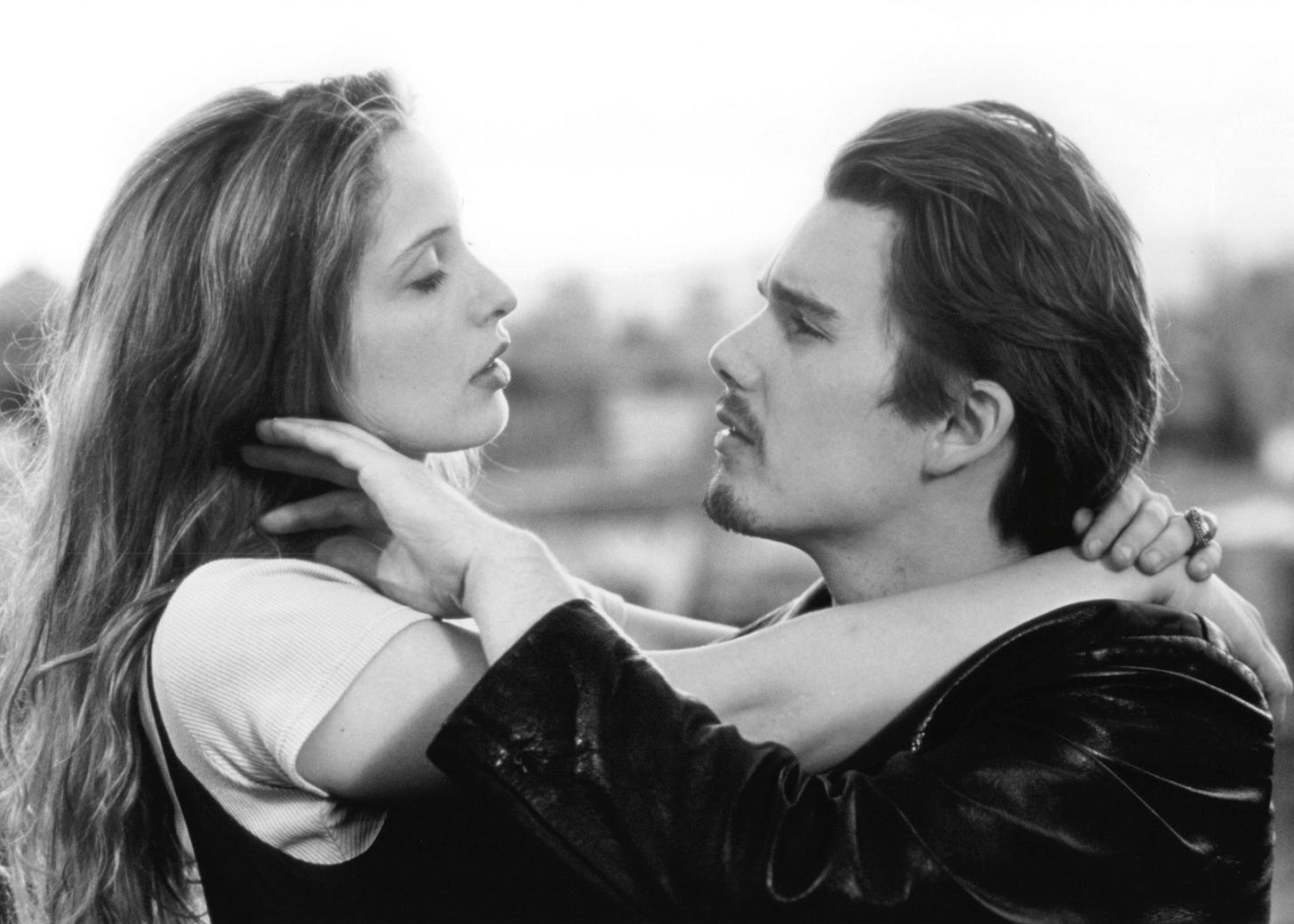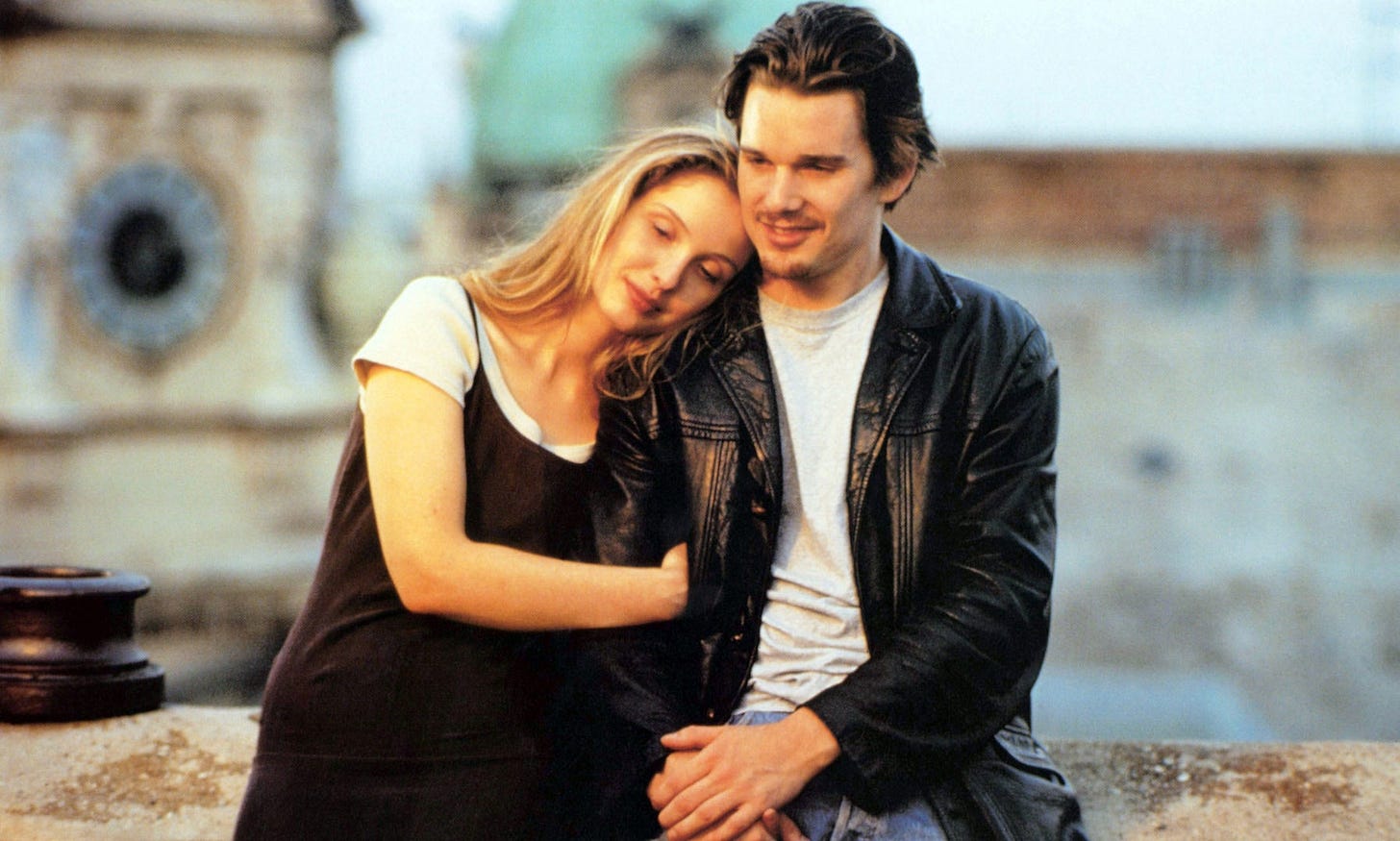Before Sunrise: An Off-Balance Retrospective.
The first chapter in one of film's greatest love stories turns 30 this month.
And we’re back! I hope everyone had a restful holiday season.
Naturally, this newsletter will discuss Before Sunrise and its two sequels, Before Sunset and Before Midnight in depth. If you’ve yet to see them, please do consider this your spoiler warning.
Additionally, as the Off-Balance community continues to grow? Thank you for all your support, guidance and readership in 2024: here’s to an even better 2025.
Cheers,
Ryan
For if the time capsule must be built, it was decreed, let Richard Linklater be the architect. Who, though he has dabbled around the edges of many genres, has always been a filmmaker at his best and most at home when looking to capture the minute of the human experience within a certain time-and-place.
Be it with the experimental edge of his first, fully-realized effort, 1990’s Slacker or the generation-defining tentpole of Dazed and Confused three years later. Not one for bombast or raw spectacle but instead, something softer and wholly personal: blurring the line between period piece and a gently forgotten memory.
Though with his third project, Before Sunrise? It is to see that approach be even further refined.
Linklater, alongside his equally-as impressive collaborators, crafting a slice-of-life film that remains just as strong and enduring now as it was upon release, 30 years ago, in January of 1995.
Built around a romance that, whilst undeniably fantastical is careful to never push itself beyond the established limits of that whimsy either - in telling a story, the first in an eventual trilogy, that speaks, deeply, to relationships and the layers on which they’re built.
Our lives may be delicate, fragile things yes but Sunrise, again-and-again?
It insists they can be even more.

On the train from to Budapest to Vienna, innocuously enough, Jesse (Ethan Hawke) strikes up conversation with the young woman across from him, Céline (Julie Delpy).
Their connection, immediate through it may be, is clear.
Jesse, after a difficult breakup, has been somewhat aimlessly travelling around Europe before needing to return home to the United States the following morning. Céline, after visiting her grandmother, is making her way back to Paris.
And in the moment, though he doesn’t even know her name, Jesse, seemingly spurred on by his own bravado, invites Céline to spend the day with him in Vienna - she accepts.
For this is the film’s hook: two people, one city and the personal deconstruction that takes place within it, as they discuss everything from their surroundings and those they meet, to musings on numerous facets of life, death and everything in between. Interwoven with the slow realization, though having boldly proclaimed their indifference otherwise, that they are falling in love.
It is a marvellous display of creative swagger because yes, on their own, none of these elements are, in a vacuum, entirely unique: the meet-cute, the building undercurrent of romance or even the looser, exploratory nature of the dialogue.
But Sunrise, right from the appearance of its opening title card, is full of such energy, such confidence, it is indomitable.
One can’t help but be drawn in.
In terms of a central plot, no, there isn’t one, not really.
The stakes are clear (Jesse and Céline, they only have one day together) but this worry, it only really exists very much in the background, at least until the film’s closing stanza.
The focus, instead, is simply on seeing how that time together is spent, wherever it leads.
Officially co-written by Linklater and Kim Krizan, Sunrise unfurls almost in a series of miniature vignettes as its protagonists casually adventure throughout the Austrian capital. From a cemetery, a Ferris Wheel to a record store, to cafes and clubs, Jesse and Céline engage in what can be viewed, through one lens, as history’s most meditative first date.
Dually-inspired, evidently by a real encounter Linklater had with a woman while he was passing through Philadelphia in the late 1980s as did Krizan with an unnamed man, per her own recounting, the movie quickly embraces this will-they, won’t-they angle and doesn’t once let go (though per Delpy, her and Hawke rewrote a vast majority of film, uncredited - they would both be credited on the sequels).
As they get to know each other however, Jesse and Céline also learn a little about themselves in the process.
Oscillating, as they are, between life’s trivialities to heavier personal anecdotes as they both prod through their pasts and with the optimism provided only by youth, wonder aloud about the future: though not just theirs but the world at large.
Be it parenthood, the grandiosity of religion or the legitimacy of a palm reader. Deducing how they’ve arrived at this particular place, at this particular time and just where it might take them next. Alternating, scene-to-scene, line-to-line, between cynicism, dashes of immaturity and a deep profundity.
Never stilted or forced, Sunrise’s dialogue to this point, vast and rich though it is, is also remarkably human: lived-in to such a believably genuine extent that the praise must then turn to the leads, Delpy and Hawke: who performances inundate their characters with such raw honesty it nearly flies off the screen.
Believable though they may be as young adults just beginning to truly find their place in the world (both were well into their 20s during production), Delpy and Hawke were already established, accomplished performers by the mid-1990s and their front-facing ability is present right from the jump.
Neither, not once, upselling the other, as they work in total synch.
And while the whole crux of the film is sold within them being on, mostly, the same emotional/intellectual/broader spiritual wavelength (something that they sell perfectly) the distinction between their characters lies primarily within their interpretation of the unspoken. Jesse’s more wired, restless physically, contrasted with Céline’s slightly more focused, purposeful way of operating, this too, feeding into their characterizations.
Be it dancing in the shadow of an unknowing harpsichordist or in one of the movie’s more memorable scenes, sharing silence, save for the music.
Jesse can, outwardly, be something of a pessimist and Céline, on the same hand, is, seemingly, more than happy to leave herself to fate, only until both are betrayed at the film’s close by what they swore wasn’t true - a hopeless romanticism.
Not content to allow themselves to completely driven by the whims of the unfeeling universe, they plan to meet again in six months: knowing nothing but each other’s names and an agreed upon date. It is almost enraging, within the semi-juvenile arrogance it presents and yet, it fits beautifully.
Each believing, right until the final fade, that this nigh-dream-like experience will endure, just as their hopes and dreams will in equal measure.
Cosmic course corrections, nothing but an abstract musing.
Sunrise has, so far, been followed by two sequels: 2004’s Before Sunset and 2013’s Before Midnight, both, in their own way, showing how such utter positivity isn’t without fault.
Jesse and Céline, reuniting nine years later in Sunset only to learn that their time apart was not without heartbreak of a different sort: that, the trials of navigating adulthood proper without the blanket of societal pretence while Midnight builds on this, albeit, in its own way. Showing marriage and parenthood, long absent that feeling of “what could be”, instead, knowing only “what is”.
Each was rightfully acclaimed (with Oscar nominations for Best Adapted Screenplay for both), expertly expanding on the foundation the first film laid.
In the never-ending discussion of what constitutes the medium’s greatest trilogies, greatest films? Of Before’s collective place, there is absolutely no doubt.
There are, in their totality, some of the best movies ever made.
Though while a potential fourth film has, as of this writing, yet to materialize, to exist as they are, it is almost comforting in a way: windows simultaneously into the past, perhaps the present and for some, a possible, uncertain future (speaking to Variety in 2021, Delpy acknowledged how her, Hawke and Linklater had discussed an idea for a fourth film that, clearly, has yet to find its legs).
And yet, even knowing what followed, to creative heights surpassed, there is something about Before Sunrise that endures the way its successors haven’t, touched with a quiet, filmmaking magic, not without reproach but lacking in any pronounced flaws.
Frequent Linklater collaborator, cinematographer Lee Daniel, who, without fanfare, frames Vienna as the film’s third lead or Linklater’s soft-handed but sharp-eyed, impactful direction. Pushing his protagonists forward but seemingly, not without their input either. The small supporting cast, none of whom play named characters but yet, capture the verisimilitude that comes with passing through a metropolis with great memorability.
The work of credited costume designer, Florentina Welley, who finds a subtly within Jesse and Céline’s single wardrobes. Jesse, discarding his well-worn sweater early on in exchange for a t-shirt and leather jacket combo: that classic, James Dean-esque look perhaps, subconsciously, put on to impress Céline, who, in contrast, content by way of probable necessity, sticks with her casual dress and shoes throughout.
The way it simply feels, the way it transports the viewer into its world for two hours that never feel misspent.
Sunrise, 30 years later be dammed? It is timeless still.







